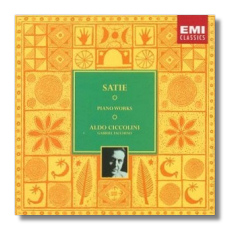
The Internet's Premier Classical Music Source
Related Links
- Satie Reviews
- Latest Reviews
- More Reviews
-
By Composer
-
Collections
DVD & Blu-ray
Books
Concert Reviews
Articles/Interviews
Software
Audio
Search Amazon
Recommended Links
Site News
 CD Review
CD Review
Erik Satie

Complete Piano Music
Aldo Ciccolini, piano
with Gabriel Tacchino in the four-hand works
EMI Classics 5 85602 2 DDD 5CDs: 65:14, 67:50, 70:02, 72:10, 57:36
Ciccolini's Satie is not so old – he made these recordings between 1983 and 1986 in Paris's Salle Wagram – yet EMI Classics already has released them in a budget-priced box set. The result is a great bargain for any collector who wants to dig more deeply into Erik Satie's oeuvre.
In assembling this collection, EMI Classics has been clever in ensuring that each of the five discs contains at least one of the composer's most important piano works; the goodies aren't all bunched together. Each CD contains an assortment of music programmed in roughly chronological order. (It isn't always easy to know when Satie wrote some of this music, however.) There's a fair assortment of music that seems to have been forgotten until the advent of performance editions by Robert Caby in the late 1960s. And unlike some of his competitors (for example, Jean-Yves Thibaudet, in his recent set for Decca), Ciccolini includes the music requiring four hands, where he is joined by Gabriel Tacchino. Satie is at his most hilarious in some of these four-handed works, including the "fantaisie sérieuse" La Belle Excentrique, which brings this set to a close. Given the state of Satie's personal life, "complete" probably is relative term, but this collection leaves no stone unturned, even down to the twenty-second Allegro composed when Satie was still a teenager. (This is not the shortest selection here, I might add.)
Not all of these works are of equal interest, yet enjoyment never flags. Satie was more than a trickster, an aspect of his personality that is over-emphasized. His music was very forward-looking, and there are anticipations of composers as different as Philip Glass, Morton Feldman, and John Cage. Many of his works feel as pure and yet eloquent as one of those featureless statuettes that have come to us from the dawn of history.
I haven't heard all of Thibaudet's set, but I think that most listeners would be satisfied either with him or with Ciccolini, so perhaps it comes down to price (Ciccolini is cheaper, although Thibaudet's five-disc set appears to be selling at a three-disc price) and whether or not you want the four-handed works. Ciccolini has a good sense of humor, yet he's never crass, and he never belabors the obvious. Furthermore, he gives Satie's more introspective works their needed gravity. Rarely, the feeling of routine creeps in, but as I suggested above, some of Satie's workbench scraps seem to have found their way into his canon, for better or worse.
EMI's recording is bright, and the piano has been recorded realistically. An added attraction is the booklet note by James Harding, which is as affectionate as it is thorough.
This is a grand bargain, so don't hesitate if you're at all interested.
Copyright © 2004, Raymond Tuttle


















